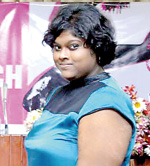Waltzing with murder
View(s):Using a spate of beggar killings as inspiration for her newly-released novel, Nivanka Fernando says ‘The Savage Dance’ explores the concept of ‘internal horror’
After publishing a book of poetry in 2010, Nivanka Fernando decided that the next logical step in her literary progression would be a novel. She possessed the writing skills, what she needed was inspiration for a gripping tale. That was when the idea of murder found her. And after months of grappling with its many intricacies, she moulded it into the overriding theme of her newly-released work of fiction ‘The Savage Dance’.
 The 165-page psychological thriller, which is based on the spate of beggar killings which occurred a few years ago, explores what Nivanka describes as “internal horror.” “I’m a big fan of Stephen King and classical authors like Mary Shelley. But where they look more at monsters and things like that, I think most writers are now talking about internal monsters and the internal horror which exists within individuals,” Nivanka explains.
The 165-page psychological thriller, which is based on the spate of beggar killings which occurred a few years ago, explores what Nivanka describes as “internal horror.” “I’m a big fan of Stephen King and classical authors like Mary Shelley. But where they look more at monsters and things like that, I think most writers are now talking about internal monsters and the internal horror which exists within individuals,” Nivanka explains.
Since releasing her poetry collection, Nivanka says she has also matured as a writer and this growth has manifested a heightened confidence to push the creative boundaries of her craft and try new things-like incorporating a set of poems into her new book as a sort of preamble to each chapter.“I had already written a collection of poetry but rather than release it separately I thought it would be better to put it into the book as a way to draw people towards poetry. I don’t use a lot of dialogue in the story unlike most other authors so I was looking to use poetry as a tool to connect with the reader,” she says.
In a sense, The Savage Dance has almost grown with Nivanka throughout the past few years. She finished it a few months after the release of her poetry anthology, ‘Bittersweet Serenade’, and then banished it to the depths of a cupboard before excavating it two years later. Goaded by family and friends, she showed it to a publisher, and the rest is a gruelling history of painstaking editing which led to her finished work.
“At first I never thought I could write a novel; I didn’t have the application and did not know how to structure it. So a lot of people have helped me since, for example Dr. Daya Dissanayake, a state literary award winner. The book was half its length when I contacted him.“Writing a book is actually quite different to editing it. While you’re editing it is when half of the content gets added to it, because you keep changing and experimenting with the plot,” Nivanka explains.
However, she remarks that she finds constructing poetry a considerably harder task than compiling a novel, primarily because with prose once a narrative flow is acquired, the words more or less tumble forth.
Also helping her with the novel’s characterisation was the extensive research born through her studies in psychology, an essential component of her Sociology degree. She infused much of this understanding into the personalities of her book’s central figures, who were also derived from people she met and read about.
After waltzing with murder for so long, it is only sensible for things to get more surreal for Nivanka. That is why she is looking to the science fiction genre as her next literary frontier. Although this is entirely new territory for her, it is unlikely to flummox a writer who consistently shows such willingness to embrace the unknown and who has, perhaps in her own inimitable way, actually grown through it.


